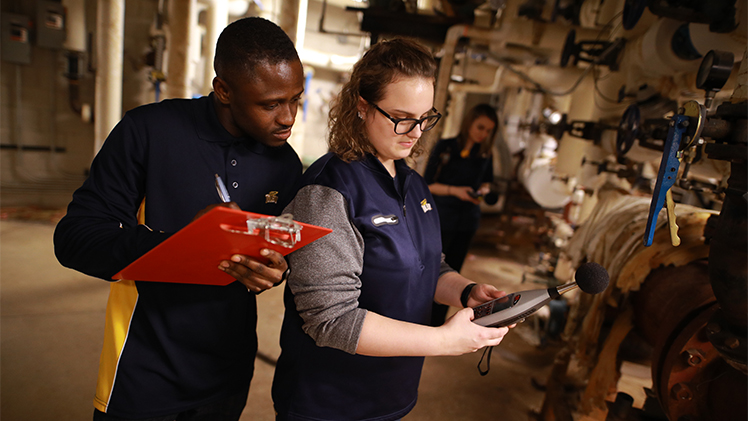It’s hard to remember a time when the field of public health wasn’t in the public eye. But as an undergraduate in the time before social distancing and masks, Ashleigh Konopka had never heard of public health. She planned on a career as a physician.
Then she met a University of Toledo public health professor during a research experience the summer before her senior year, and the premed biology major knew she wanted to change her focus — from treating disease as a physician to preventing and educating about disease as a public health professional.

CELEBRATING SUCCESS: During this time when we cannot come together to celebrate our graduates, UToledo is recognizing the Class of 2020 with a series of feature stories on students who received their degrees during our Dec. 6 virtual commencement ceremony.
Konopka earned her master’s degree in public health from UToledo last spring and graduated in December from UToledo with a master of science in occupational health.
Since August, when she was hired as an epidemiologist at the Wood County Health Department, she’s been learning about the daily life of a public health professional firsthand.
Thrust into the middle of the COVID pandemic, Konopka does contact tracing, working closely with Bowling Green State University, where she earned her undergraduate degree. She also reports the numbers of COVID cases in the county schools. She works overtime every week, supporting her colleagues in healthcare who are struggling.
“People with COVID struggle mentally,” she said. “Being that person to call and check in is important for me.”
UToledo set her up perfectly for her job, Konopka said.
“I gained an understanding of serving the community,” she said.
When she was an undergraduate, Konopka was one of 10 students selected from across the country to participate in UToledo’s National Science Foundation Research Experience for Undergraduates. She spent a summer conducting research at the Lake Erie Research Center.
While surveying residents about how algal blooms impacted their recreational activity on Lake Erie, Konopka worked with UToledo faculty mentors, Dr. April Ames and Dr. Michael Valigosky.
Ames, an assistant professor of public and occupational health, introduced Konopka to public and occupational health and eventually became her faculty advisor.
“Ashleigh was eager to learn and meet others in the occupational and public health fields. She enjoyed mentoring local high school students who were learning about and evaluating air quality,” Ames said. “Ashleigh’s positive attitude and determination were appreciated by all through her tenure in the program and will contribute to her career success.”

Hired in August as an epidemiologist at the Wood County Health Department, Ashleigh Konopka has been learning about the daily life of a public health professional firsthand.
Konopka didn’t know a soul when she entered the master’s program, so faculty relationships were important to her and the key to her success, she said.
“They made the extra effort to get to know me on a personal level,” she said. “I wouldn’t have gotten through grad school without them. It wasn’t just the learning in the classroom. I went to office hours and they checked in to make sure I was doing OK academically and personally.”
She and several other students resurrected the inactive Public Health Student Organization. She became president and organized social gatherings and volunteer opportunities.
A graduate research assistantship and two internships also gave her hands-on opportunities in public and occupational health.
One of her internships was with Lott Industries, a nonprofit that provides educational and job opportunities for people with developmental disabilities. Konopka created a survey to measure employees’ health and well-being. She interviewed employees and analyzed the data, making recommendations to the company.
She was in the middle of her second internship, with the Lenawee (Mich.) County Health Department, when COVID struck.
Now she’s learning more about public health every day on the front lines of the pandemic. Educating the public about the role of public health in the community is one of her goals, and she’s grateful for the opportunity to do that.
“I want to make a difference,” she said.